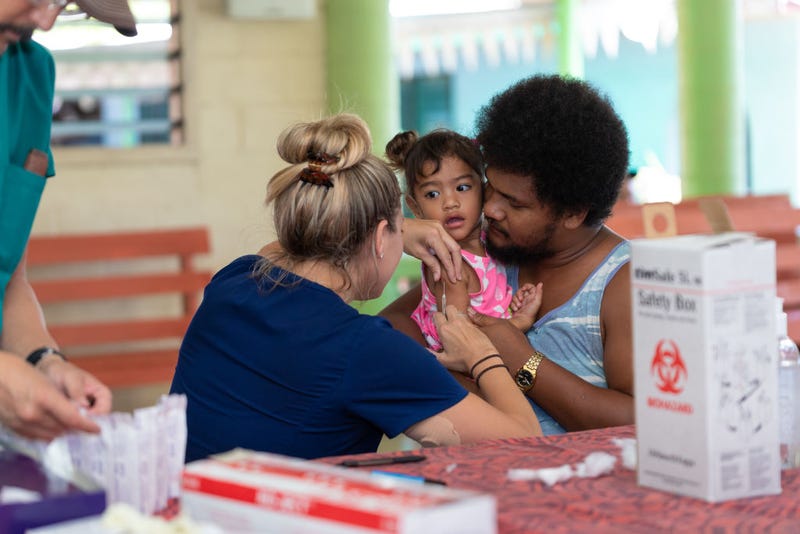
As the COVID-19 pandemic took hold last year, there was the largest drop in vaccination rates for children against measles in 20 years, said a recent report from the Centers for Disease Control and Prevention.
Overall, an estimated 22.3 million infants worldwide missed their measles vaccinations last year. This is an “acute setback in progress towards measles elimination,” said the report, which includes data from the World Health Organization.
Measles, also called rubeola, is a childhood infection caused by a virus, according to the Mayo Clinic.
Around 10 to 14 days after children are exposed to the virus, they can experience symptoms such as fever, dry cough, runny nose sore throat and inflamed eyes. Other specific signs of infection are tiny white spots with bluish-white centers on a red background found inside the mouth on the inner lining of the cheek called Koplik's spots and a skin rash made up of large, flat blotches that often flow into one another.
The infection occurs in a sequence of stages during a period of two to three weeks and it can become serious or even fatal.
Death rates have been falling worldwide as more children receive the measles vaccine. Yet, the disease still claims more than 100,000 lives annually, typically children younger than 5.
“Once quite common, measles can now almost always be prevented with a vaccine,” the Mayo Clinic said. While the number of measles cases in the U.S. dropped to 30 in 2004, it was up to 600 in 2014.
According to a 2011 paper published in the Indian Journal of Psychiatry, a 1998 study in the Lancet journal connecting measles vaccines to autism was retracted and its authors were exposed for scientific fraud. However, the paper had an impact.
“Appallingly, parents across the world did not vaccinate their children out of fear of the risk of autism, thereby exposing their children to the risks of disease and the well-documented complications related thereto,” said the 2011 paper. “Measles outbreaks in the UK in 2008 and 2009 as well as pockets of measles in the USA and Canada were attributed to the non-vaccination of children.”
Another paper in Global Pediatric Health from 2019 noted the 1998 study’s impact on vaccination of children.
In order to maintain high population immunity against measles, the CDC and WHO recommend at least 95 percent vaccination coverage and aim to have all children vaccinated with two doses of measles vaccine. Since 2010, coverage with the first dose – MCV1 – has stagnated, the CDC said.
“Accelerated efforts are needed to expand MCV1 coverage among the 22.3 million unvaccinated children in 2020 and ensure immunization of future birth cohorts,” said the centers.
Vaccinations were down last year, but annual reported measles incidence decreased in 2020 and estimated deaths deceased by 94 percent over the past two decades. The CDC, however, warned that surveillance of the virus worsened last year.
“Large numbers of unvaccinated children, outbreaks of measles, and disease detection and diagnostics diverted to support COVID-19 responses are factors that increase the likelihood of measles-related deaths and serious complications in children,” said Kevin Cain, the CDC’s Global Immunization Director. “We must act now to strengthen disease surveillance systems and close immunity gaps, before travel and trade return to pre-pandemic levels, to prevent deadly measles outbreaks and mitigate the risk of other vaccine-preventable diseases.”
Vaccination activities against measles were also postponed in 23 countries last year due to the COVID-19 pandemic, impacting approximately 93 million people.
“While reported measles cases dropped in 2020, evidence suggests we are likely seeing the calm before the storm as the risk of outbreaks continues to grow around the world,” said Dr Kate O’Brien, Director of WHO’s Department of Immunization, Vaccines and Biologicals.
Measles vaccination has prevented an estimated 31.7 million deaths worldwide, said the CDC. As of this year, no WHO region has achieved and maintained elimination of the virus.


